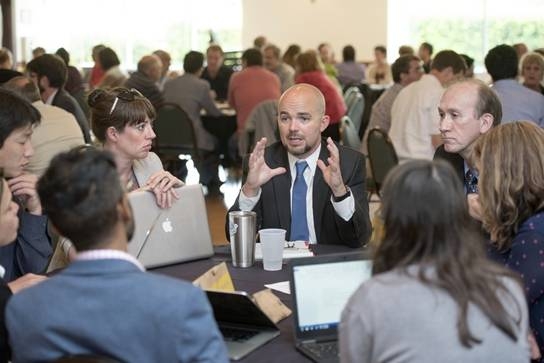LEADERSHIP
GCC Director

The Global Change Center is led by its Founding Director, Dr. William A. Hopkins. He is also the Founding Director of the GCC’s Interfaces of Global Change, an Interdisciplinary Graduate program. Dr. Hopkins is the Associate Executive Director of the Fralin Life Sciences Institute.
Dr. Hopkins joined Virginia Tech in 2005 and is a Professor in the Department of Fish and Wildlife Conservation. His research focuses on how anthropogenic threats like climate change affect reproduction and parental care in wildlife, and how these disruptions can affect population dynamics and ultimately biodiversity. Dr. Hopkins is an award winning teacher and researcher, to include the highest honors offered by his home department, college, the University, and the Commonwealth of Virginia. He also frequently provides scientific expertise to decision makers in Washington and to the National Academies of Sciences, Engineering, and Medicine, and he has been featured in diverse news outlets to include 60 minutes, NPR, and the New York Times.
GCC Advisory Committee
A committee of faculty from diverse disciplines at Virginia Tech provide high-level support and diverse perspectives to the GCC Director. The Advisory Committee is responsible for vetting major decisions that affect the center, identifying new opportunities, ideating new initiatives, and evaluating the progress and efficacy of the Center’s existing programs and procedures.
Current Board Members
-
General Item
 Dr. William Hopkins
Dr. William HopkinsProfessor | Fish and Wildlife Conservation
-
General Item
 Dr. Jonathan Czuba
Dr. Jonathan CzubaAssociate Professor | Biological Systems Engineering
-
General Item
 Dr. Gillian Eastwood
Dr. Gillian EastwoodAssociate Professor | Entomology
-
General Item
 Dr. Emmanuel Frimpong
Dr. Emmanuel FrimpongProfessor | Fish and Wildlife Conservation
-
General Item
 Dr. Dana Hawley
Dr. Dana HawleyProfessor | Biological Sciences
-
General Item
 Dr. Craig Ramseyer
Dr. Craig RamseyerProfessor | Geography
-
General Item
 Dr. Michelle Stocker
Dr. Michelle StockerAssociate Professor | Geosciences
-
General Item
 Dr. Josef Uyeda
Dr. Josef UyedaAssociate Professor | Biological Sciences
GCC Staff

PROGRAM COORDINATOR
Under the leadership of the center director, Steph McBride guides the coordination and execution of the Global Change Center's interdisciplinary programs for faculty and students, as well as supports the center's communications needs and engagement.
A native of Indianapolis, IN and graduate of Ball State University, Steph has an educational background in Natural Resources and Environmental Management. After developing a career in outdoor education through parks and museums, she relocated to Florida where she spent a decade at the University of Florida planning events. She now continues her professional journey in higher education at Virginia Tech in the Global Change Center.

EVENT COORDINATOR
Under the leadership of the center director, Michaella O'Brien assists with the coordination and execution of events within the Global Change Center.
Michaella received her B.S. in Public Relations from Lee University and has worked as a marketing coordinator for several years. After traveling the U.S. while working for a non-profit, Michaella discovered her passion for the education sector. Since then, she has utilized past marketing roles to promote education and increase event impact.



